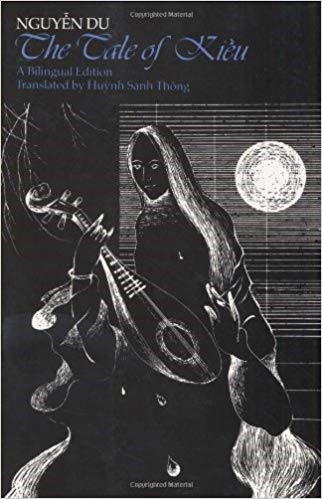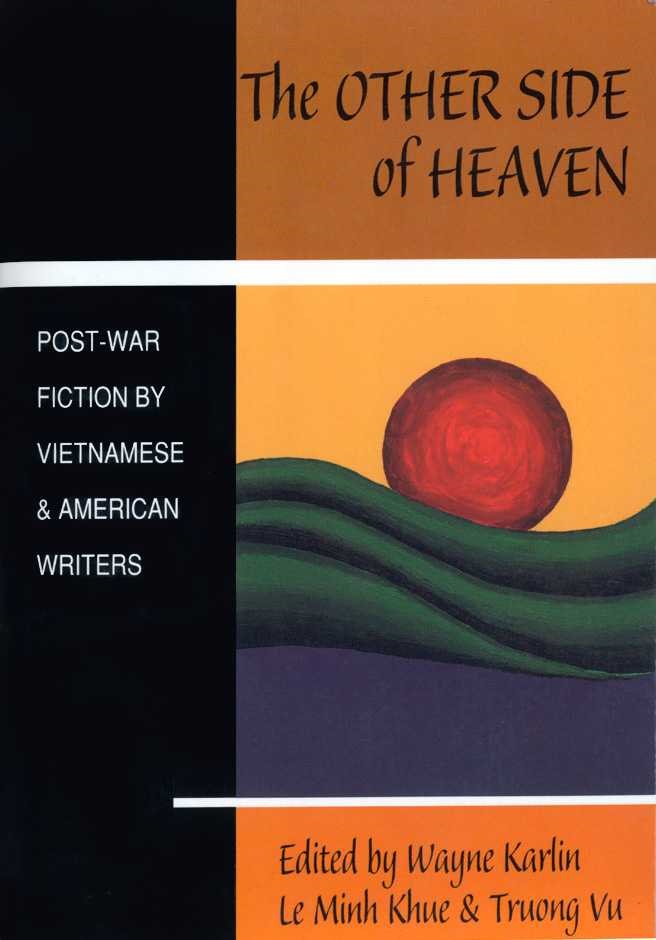 |
| The Tale of Kieu-a bilingual edition of Nguyen Du’s Truyen Kieu. — Photo amazon.com |
Viet Nam News
by Ho Anh Thai
If Vietnamese literature wants to find a place overseas, writers need to start finding publishers. So what should we do to approach foreign publishers?
To answer the question, let’s first review Vietnamese books that have been translated over the past few decades.
In the early 1990s, a number of European and American publishers started becoming aware of Vietnamese literature partly thanks to foreign news agencies in Viet Nam. In addition to collections of short stories and poetry, the majority of translated books were written by 10 well-known authors.
European and American publishers only focus on authors with a reputation for producing profitable books, the so-called goose that lays the golden egg. Publishers also have an ability to seek out authors who will make them a profit. If needed, editors will travel far and wide to track down these writers and secure deals with them. Publishers and editors’ reputations grow thanks to these forays. Although there are some lucrative works to be found in existing manuscripts, publishers are usually keen to meet the writers in person. Unknown authors who submit their works are often ignored, despite their potential.
So where should authors send their manuscripts to?
Writers need an overseas literary agent: a writer, literary critic or prestigious literary professor who knows them and appreciates their work. These people act as agents and negotiate with publishers. Most Vietnamese authors of translated books in the last 30 years had their own agents, official or unofficial.
"Ways to contact publishers can sometimes take people to an unknown place," said a friend in Seattle. He is a retired lawyer and also writes during his free time. He and his friends have started a writing club. Their houses are full of books about how to write short stories and novels and get printed.
The titles of these books remind us that literature in Europe and America tends to be technical. Any job can be formulated and has a process. People do not mystify about the profession of literature. My American friend has read dozens of such books, but the way to approach a publishing house is still a mystery. The books have taught him almost everything, but he still had to ask me how to approach a publishing house?
In the early 1990s, news about the prosperity of Vietnamese literature was found in The New York Times, Time, Newsweek, International Herald Tribune, Far Eastern Economic Review ... which led some publishers to look for Vietnamese authors. More than 10 Vietnamese authors were sought out. For the publishers that had my books printed, I used to work as a "literary representative" by introducing them to other authors. We summarised the content of each novel in 500-700 words, and how Vietnamese readers welcomed the book. In this way, more works were translated. We did the same way with Tinh Yeu Sau Chien Tranh (Love After War) by summarising the content of nearly 80 short stories. The publisher then picked 50 stories by 50 authors, hired translators and editors and eventually the book was published and selected by the San Francisco Chronicle as one of the 100 best books of the year.
Having said that, most foreign publishers do not think Vietnamese literature is a gold mine. Some books have been successful in prestigious newspapers and welcomed by lecturers and graduate students who have been doing the Vietnamese studies.
Vietnamese books have been recently published by small publishers. In the United States, universities have printed from 1,000 to 2,000 copies of a number of Vietnamese books. Some non-profit publishers have printed about 5,000 copies for the first time. The books are available in the federal book system and on amazon.com. The royalties paid by this type of publisher are not high, but if the books sell out, they will be reprinted annually and the royalties will still be paid regularly to the author, even after the first edition. The number of printed books depends on a survey of purchasing capacity before publication. Usually, a publisher will not publish a book if the purchasing capacity is less than 5,000 copies.
 |
| Tinh yeu sau chien tranh (Love after War)—a collection of 50 short stories which have been selected by San Francisco Chronicle as one of 100 best in 2003. — Photo courtesy of the writer |
 |
| The cover of the book Phia ben kia goc troi (The Other Side of Heaven. — Photo courtesy of the writer |
Which books have been translated for print?
Curbstone Press is a small publisher but its books are in bookstores throughout the United States and on amazon.com, and have stirred public opinion in prestigious American newspapers. In the past 20 years, this publisher has been building a series of books on Vietnamese literature called Voices from Vietnam (Nhung tieng noi tu Viet Nam) and has published books including Phia ben kia goc troi (The Other Side of Heaven); Tinh yeu sau chien tranh (Love After War); Nhung ngoi sao, Trai dat, Dong song (The Stars, the Earth, the River) by Le Minh Khue; Sang Song (Crossing the River) by Nguyen Huy Thiep; Trong Suong Hong Hien Ra (Behind the Red Mist) by Ho Anh Thai, Nghia dia xom Chua (The Cemetery of Chua Village) by Doan Le; Nguoc dong nuoc lu (Against the Flood) by Ma Van Khang; Thoi gian cua Nguoi (Past Continuous) by Nguyen Khai; Gia dinh be mon (An Insignificant Family) by Da Ngan; Cay thoi gian (The Time Tree) by Huu Thinh; and Duong xa (Distant Road) by Nguyen Duy.
Universities also occasionally publish Vietnamese literature in English for reference: Oxford University published Anh sang kinh thanh (The Light of the Capital), a reportage by Tam Lang, Vu Trong Phung and Nguyen Hong; the University of Michigan printed So do (Dumb luck) by Vu Trong Phung; the University of Massachusetts published Thoi xa vang (A Time Far Past) by Le Luu, Nhung nguoi dan ba ganh nuoc song (The Women Carry River Water) by Nguyen Quang Thieu, Noi buon chien tranh (The Sorrow of War) by Bao Ninh; the University of Washington translated Nguoi dan ba tren dao (The Woman on the Island) by Ho Anh Thai.
L’Aube publishing house in France is more interested in Vietnamese literature, has had problems with royalties for reprinting books with some Vietnamese writers: Tuong ve huu and Trai tim ho by Nguyen Huy Thiep; Nguoi vai linh hon by Vu Bao; Dao dan ba va Tieng tho dai qua rung kim tuoc by Ho Anh Thai; Manh dat lam nguoi nhieu ma by Nguyen Khac Truong and An may di vang by Chu Lai.
The Tranan publishing house in Sweden also printed a Vietnamese book set thanks to support from the Swedish International Development Cooperation Agency: Tuyen tap truyen ngan Viet Nam, De men phieu luu ky by To Hoai; Con mua cuoi mua by Le Minh Khue; Muoi cua rung by Nguyen Huy Thiep; Tuyen tap truyen by Ho Anh Thai; Khi nguoi ta tre by Phan Thi Vang Anh; Vua nham mat vua mo cua so by Nguyen Ngoc Thuan; and a poetry collection by 12 Vietnamese poets.
In South Korea a few Vietnamese books have been translated but mostly from English, but recently some have been translated directly from Vietnamese into Korean. One of the most recently translated books is Ao trang by Nguyen Van Bong. In the past several years, more books have been translated into Korean such as Tuyen tap truyen ngan Viet Nam and Noi buon chien tranh by Bao Ninh; Bi kich nho by Le Minh Khue; Nguoi dan ba tren dao and Coi nguoi rung chuong tan the by Ho Anh Thai; and Canh dong bat tan by Nguyen Ngoc Tu.
In addition, in others countries, some works are also quite popular such as Tho Ho Xuan Huong translated by John Balaban (Spring Essence: The Poetry of Ho Xuan Huong); Truyen Kieu (The Kim Van Kieu of Nguyen Du) a new translation by Vladislav Zhukov, not focusing on meaning but on an ancient poetry style; Dem qua toi mo thay hoa binh, a diary by Dang Thuy Tram.
Collected by Quang Toan
OVietnam